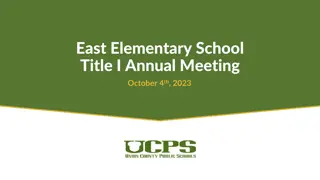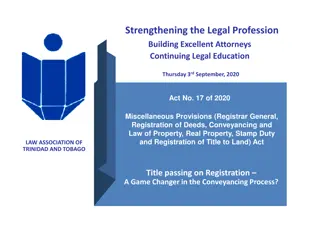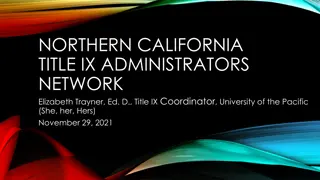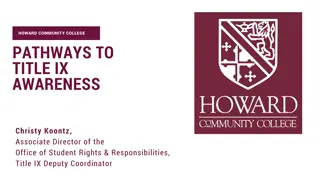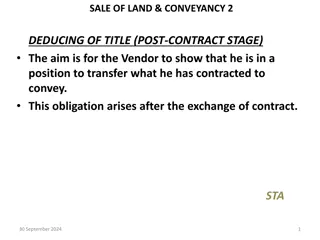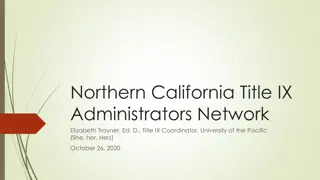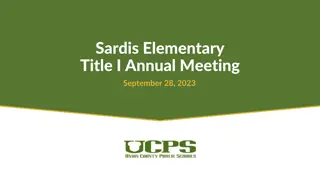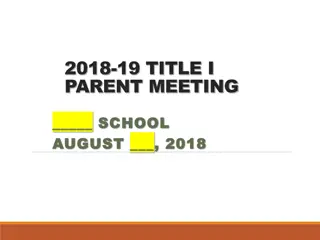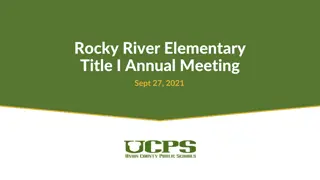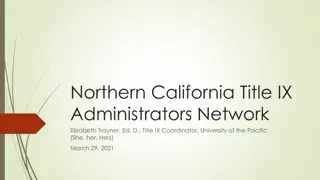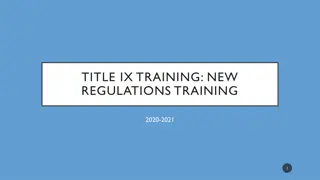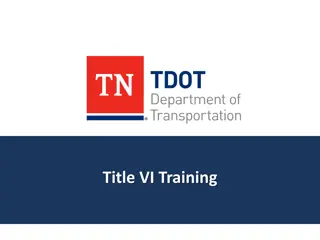
Fidelity's Fifteen Minute University and Common Title Issues
Explore Fidelity's Fifteen Minute University covering topics like risky payoffs, common title issues, and the O.C.G.A. 44-14-3 method and time of cancellation. Understand penalties for improper cancellations and definitions related to revolving loan accounts.
Uploaded on | 0 Views
Download Presentation

Please find below an Image/Link to download the presentation.
The content on the website is provided AS IS for your information and personal use only. It may not be sold, licensed, or shared on other websites without obtaining consent from the author. If you encounter any issues during the download, it is possible that the publisher has removed the file from their server.
You are allowed to download the files provided on this website for personal or commercial use, subject to the condition that they are used lawfully. All files are the property of their respective owners.
The content on the website is provided AS IS for your information and personal use only. It may not be sold, licensed, or shared on other websites without obtaining consent from the author.
E N D
Presentation Transcript
Welcome to Fidelitys Fifteen Minute University 1
O.C.G.A. 44-14-3 Method and time of cancellation; penalty for failure of proper cancellation: (b)(1) Whenever the indebtedness secured by any instrument is paid in full, the grantee or holder of the instrument, within 60 days of the date of the full payment, shall cause to be mailed to the grantor, at the grantor's last known address as shown on the records of the grantee or holder of the instrument, written notice of the grantee's or holder of the instrument's transmittal of notice of satisfaction or cancellation as required by this subsection and notice of the grantor's right to demand payment of $500.00 in liquidated damages from the grantee or holder of the instrument if such obligation is not timely met. (2) Whenever the indebtedness secured by any instrument is paid in full, the grantee or holder of the instrument, within 60 days of the date of the full payment, shall cause to be furnished to the clerk of the superior court of the county or counties in which the instrument is recorded a legally sufficient satisfaction or cancellation to authorize and direct the clerk or clerks to cancel the instrument of record. The grantee or holder of the instrument shall further direct the clerk of the court to transmit to the grantor the original cancellation or satisfaction document at the grantor's last known address as shown on the records of the grantee or holder of the instrument. In the case of a revolving loan account, the debt shall be considered to be paid in full only when the entire indebtedness including accrued finance charges has been paid and the lender or debtor has notified the other party to the agreement in writing that he or she wishes to terminate the agreement pursuant to its terms. 4
RISKY PAYOFFS: 1. Revolving Loan Accounts HELOCs Lines of Credit 5
O.C.G.A. 44-14-3 Method and time of cancellation; penalty for failure of proper cancellation (a) As used in this Code section, the term: . . . (6) Revolving loan account means an arrangement between a lender and a debtor for the creation of debt pursuant to an agreement secured by an instrument and under which: (A) The lender may permit the debtor to create debt from time to time; (B) The unpaid balances of principal of such debt and the loan finance and other appropriate charges are debited to an account; (C) A loan finance charge is computed on the outstanding balances of the debtor's account from time to time; (D) The debtor agrees to repay the debt and accrued finance charges in accordance with the written agreement with the lender; and (E) The limitation on the maximum amount which the debtor is entitled to become indebted under said arrangement between the lender and debtor is stated on the face of the instrument, and said amount shall be deemed to be notice of the maximum amount secured by the instrument. 6
When paying off a HELOC or revolving loan account: PRIORTOCLOSING: Freeze the Equity Line loan account when the payoff is requested. Obtain an updated payoff figure no more than two days prior to payment in full. ATCLOSING: Advise the borrower under said Equity Line that their Equity Line loan account is now closed, that they cannot borrow against it, and that they must destroy any credit card or checks attached to the account. AFTERCLOSING: Send a second letter, signed by the borrower(s), to the lender when you send the payoff monies, directing the lender to close the account. Follow up to get the cancellation. 7
What about a prior owners open HELOC ? 1. 1. If the Owner has an owner s policy, issued by Fidelity, If the Owner has an owner s policy, issued by Fidelity, we may agree to insure again. Contact us to discuss. we may agree to insure again. Contact us to discuss. 2. 2. If the Owner has an owner s policy issued by another If the Owner has an owner s policy issued by another title insurance company, we may agree to accept an title insurance company, we may agree to accept an indemnity from that company. Contact us to discuss. indemnity from that company. Contact us to discuss. 3. 3. Obtain a Cancellation. Obtain a Cancellation. 8
RISKY PAYOFFS: 2. Short Sales 3. Release Fee Construction Loan 4. Negotiated Payment 9
These are not really payoffs. Because They are NOT payment in full. 10
AND - Because they are not payment in full, there is NO STATUTORY RIGHT TO A CANCELLATION 11
If the creditor is an institutional lender 1. Proceed with great caution. 2. Get the creditor s agreement in writing. It should set forth: The dollar amount to be paid. a. The date through which the stated amount will be accepted as payment in full. b. Any conditions that must be satisfied. c. An agreement that upon payment of the stated amount within the timeframe, and satisfaction of any conditions, a cancellation will be provided. d. 3. Be sure you satisfy all conditions if any doubt, get creditor s prior approval in writing. 4. Be sure you pay the stated amount within the stated timeframe. 5.Follow up to get the cancellation. 12
What is an institutional lender? An FDIC insured bank 1. An NCUA insured credit union 2. A lender that is approved to make loans by FNMA, FHLMC , FHA and VA 3. 13
If the creditor is not an institutional lender 1. Proceed with even greater caution. 2. Get the creditor s agreement in writing. It should set forth: The dollar amount to be paid. a. The date through which the stated amount will be accepted as payment in full. b. Any conditions that must be satisfied. 3.GET THE CANCELLATION BEFORE CLOSING. c. a. Have the creditor send you, in escrow, a satisfactory cancellation prior to closing, b. Have the creditor send you written authorization to release the cancellation from escrow and record upon payment of the stated amount within the timeframe, and satisfaction of any conditions. 4. Be sure you satisfy all conditions if any doubt, get creditor s prior approval in writing. 5. Be sure you pay the stated amount within the stated timeframe. 14
When closing a short sale, make sure: You understand the payoff lender s instructions. That loan numbers and other identifying information match. You understand and can comply with every requirement. There are absolutely no reservations or conditions that would allow the payoff lender to revoke the short sale approval, refuse to cancel the security deed, or reinstate the loan and mortgage after receipt of funds (and after you have closed and disbursed funds). Follow up to get and record the cancellation. 15
When there is an open prior security deed that was paid off in a short sale: Assuming that you have no reason to believe that the holder of the prior open security deed has rejected the short payoff or has withdrawn its agreement to accept a short payoff and cancel the security deed. If the subsequent sale price is not greater than 125% of the short sale price: If the Seller has a Fidelity Owner s Policy that insures without exception to the SSSD, you may rely on the seller s title policy, to insure over the open Security Deed. If the Seller has an Owner s Policy Issued by another Company that insures without exception to the open Security Deed, please contact our office for approval of accepting an indemnity from the company that issued the policy. 16
When there is an open prior security deed that was paid off in a short sale: If the Subsequent Sales Price Is Greater Than 125% of the Short Sale Price: The Company will require that the cancellation of the open Security Deed be of record or satisfactory evidence that the cancellation is in process regardless of the title company that has insured the seller. Note, however, if it is the case that improvements have been made to the property subsequent to the short sale, and they are reasonably documented, the Company may be willing to consider that fact in this context. The Company will consider if and how the improvements can be factored in. 17
TAX APPEALS 18
Underwriting Procedure When Taxes Are Under Appeal - Sale: 1. All taxes billed under the temporary bill must be paid in full. 2. If the temporary bill is $17,000.00 or less, obtain a Personal Undertaking from the Seller and the Buyer. Contact us for the form. If the temporary bill is greater than $17,000.00, it is likely that an amount estimated to cover a potential re-bill must be deposited with Fidelity along with the attached Funded Indemnity from the Seller and the Buyer. Please contact Fidelity for possible further requirements when the temporary bill exceeds $17,000.00. 3. 4. No additional exception is required for the loan policy to be issued but the owner s policy should contain the following exception that would either appear on Schedule B or attached to an addendum to the Enhanced Owner s Policy: The (list the tax year under appeal) State and County ad valorem property tax assessment for the Land is currently under appeal. No insurance is afforded as to the outcome of the appeal or as to any taxes assessed, interest or penalties billed, which result from said appeal subsequent to the Date of Policy. 19
Underwriting Procedure When Taxes Are Under Appeal - Refinance: All taxes billed under the temporary bill must be paid in full. 1. If the pending appeal relates to a prior owner, review possible OTP coverage that may have been provided by a prior title company and possibly request an indemnity from the prior Company. 2. If the temporary bill is $17,000.00 or less, obtain a Personal Undertaking from the Owner/Borrower. 3. If the temporary bill is greater than $17,000.00, it is likely that an amount estimated to cover a potential re-bill must be deposited either: 4. Into the Owner/Borrower s new escrow account for taxes with the new lender to be used in the event additional monies are necessary relating to a re-bill resulting from the appeal along with the attached Personal Undertaking from the Owner/Borrower, or With Fidelity along with a Funded Indemnity from the Owner/Borrower. Please contact Fidelity for possible further requirements when the temporary bill exceeds $17,000.00. a. b. c. 20 No additional exception is required for the loan policy to be issued. 5.
WATER BILLS 21
O.C.G.A. 36-60-17 provides that a public or private water supplier shall not impose a lien against real property to secure unpaid charges for water furnished unless the owner of such real property is the person who incurred the charges. Conversely, if water is furnished to the owner of such real property a lien may be imposed on the property if the bill is not paid. 22
These liens have the same status and priority as ad valorem tax liens. The water department does not have to file a lien in the clerk s records. Anyone intending to purchase the property and any lender intending to loan money with the property as security is on notice to inquire, just as with ad valorem taxes. 23
In light of the foregoing, you must determine whether the city or county where the property is located takes a position that its bills for water, sewer or sanitary services are liens. If so, inquiry must be made with respect to the status of the bills for such services. If the inquiry reveals that there are unpaid current or past due bills for such services. If the bill reveals that the services were provided to the owner of the property, the bills must be paid in full before any policy of title insurance may be issued insuring without exception for the said liens. 24
If the water bills are against total strangers to the title, those bills may not need to be paid. But, you must look critically at each one. Some bills with names that are not in the chain of title would have to be paid. 25
How do you determine who falls into the category of Owner of the Property? 26
For example, if the person on title was MargaretJones and the water bill is against ThomasJones it may be that water was indeed being supplied to the owner. In the absence of information about the relationship between Margaret and Thomas, if any, you could not safely rule out that bill and would have to pay it. 27
As another example, if the name on title was Margaret Jones but Margie Jones is the name on the bill, that one is too close to rule out. (Similarly, if the name on the title is Montague Fitzgerald Smith, but the name on the bill is Montague Fitzgerald Jones that one is too close to rule out, too.) 28
Question: Let s say I purchase property, move in and use the water, but I leave the water service in my seller s name. Should I be allowed to claim that because the water is not being billed to me, that the water is not being furnished to the owner? Or should I be allowed to claim that the unpaid bill for water I used should NOT be a lien on my property? 29
The owner of the property may or may not be the person or entity who is the record owner. Example: the record owner died, and his heirs now own the property, and live in the property, but the bill is still in the name of the deceased former owner. 30
The person whose name is on the bill may not be the owner of record, but it could still be the case that the water is being furnished to the owner. Example: 31
Underwriting Question: Water charges were incurred in 2011 through 2014 in the name of Ouetta Wimmer. Can we insure over the water bill in the name of Ouetta Wimmer because she came off title in 2007, before the water charges were incurred? Supporting Documents reveal: Ouetta S. Wimmer took title in August of 1992. In September, 1992 Ouetta S. Wimmer deeded to herself and Abie C. Dee as joint tenants with right of survivorship (JTWROS) for a consideration of love and affection. In January, 2006 Ouetta Sue Wimmer a/k/a Ouetta S. Wimmer and Abie C. Dee deeded to themselves and Venus P. Lahnet, JTWROS. Transfer tax was $0.00. (So, probably, consideration was love and affection. ) In April, 2007, Ouetta S. Wimmer, Abie C. Dee and Venus P. Lahnet deeded to Abie C. Dee. Transfer tax was $0.00. (So, probably, consideration was love and affection. ) In October, 2014 Abie C. Dee, by her AIF Venus Penelope Vaux, deeded to Yale H. Emory. Answer: This is not a situation where the water department was furnishing water to a tenant. The three people who were parties to this deed apparently had some family connections. So, I think that the water department could reasonably take the position that the water was furnished to the owner. Accordingly, we cannot insure over the outstanding water bill on the basis of the fact that Ouetta Wimmer came off title before the water charges were incurred. 32
The person whose name was on the bill was not the owner of record, but, still, the water was being furnished to the owner, and the unpaid bill is therefore a lien on the property. 33
BOTTOM LINE - continued: Once the bill goes unpaid, the lien attaches, and like any other lien it stays attached after the owner transfers title to someone else. If water is being furnished in the name of a family member of the owner, or a housemate or a significant other of the owner, or a former owner, that should be treated the same as water being furnished to the owner, and the bill must be paid. Look at all facts and circumstances available. 34
BUYER LIENS WHY WE LOOK AT THEM 35
The 2003 bulletin from our Chief Underwriting Counsel said: After due consideration, it has been decided that we must run buyers names in transactions that we insure. This is due to: 1.Federal court decisions that have determined that federal non-tax liens against the buyers (student loans, penalties, etc.) have priority even over purchase money mortgages. 2.Additionally, we would be concerned about other judgments that affect their competency, bankruptcy, or the like. 37
NOTARY SEAL 39
45-17-6. Notarial seal and register; scrawl; attestation of deeds (a)(1) For the authentication of his notarial acts each notary public must provide a seal of office, which seal shall have for its impression his name, the words NotaryPublic, the name of the state, and the county of his residence; or it shall have for its impression his name and the words Notary Public, Georgia, State at Large. Notaries commissioned or renewing their commission after July 1, 1985, shall provide a seal of office which shall have for its impression the notary's name, the words NotaryPublic, the name of the state, and the county of his appointment. The embossment of notarial certificates by the notary's seal shall be authorized but not necessary, and the use of a rubber or other type stamp shall be sufficient for imprinting the notary's seal. A scrawl shall not be a sufficient notary seal. An official notarial act must be documented by the notary's seal. (2) No document executed prior to July 1, 1986, which would otherwise be eligible for recording in the real property records maintained by any clerk of superior court or constitute record notice or actual notice of any matter to any person shall be ineligible for recording or fail to constitute such notice because of noncompliance with the requirement that the document contain a notary seal. (b) It shall be unlawful for any person, firm, or corporation to supply a notary public seal to any person unless the person has presented the duplicate original of the certificate commissioning the person as a notary public. It shall be unlawful for any person to order or obtain a notary public seal unless such person is commissioned as a notary public. 40
A document executed prior to July 1, 1986, does not have to have a notary seal affixed in order to be a notarized document. While not a statutory requirement, the notary should have indicated the date of expiration of his or her commission, however. 41
BOTTOM LINE: Since 1986, IF THE NOTARY S SEAL IS NOT AFFIXED, THE DOCUMENT IS NOT NOTARIZED 42
Gap Language 43
Commitments: Gap Exception: Defects, liens encumbrances, adverse claims or other matters, if any, created, first appearing in the public records or attaching subsequent to the effective date hereof but prior to the date the Proposed Insured acquires of record for value the estate or interest or mortgage thereon covered by the Commitment. 44
OK: The policy when issued will insure against any loss or damage arising from adverse matters, if any, first appearing in the public records subsequent to the effective date hereof and prior to the date of recording of the Mortgage required in Schedule B, Section, except as to matters of which the proposed insured has knowledge. Provided, however, that the Company may update its title examination, and may add requirements and/or exceptions at any time prior to closing and disbursement Or The policy when issued will insure against any loss or damage arising from adverse matters, if any, first appearing in the public records subsequent to the effective date hereof and prior to the date of recording of the Mortgage required in Schedule B, Section, except as to matters of which the proposed insured has knowledge NOT OK: The Proposed Insured is hereby affirmatively assured that the policy when issued will not contain any exception for defects in title which are recorded during the period of time between the effective date of this commitment and the date of recording of the document creating the estate or interest being insured, except as to matters of which the Proposed Insured has knowledge. 45
Policy Gap Coverage OWNERS: 10. Any defect in or lien or encumbrance on the Title or other matter included in Covered Risks 1 through 9 that has been created or attached or has been filed or recorded in the Public Records subsequent to Date of Policy and prior to the recording of the deed or other instrument of transfer in the Public Records that vests Title as shown in Schedule A. LENDERS: 14. Any defect in or lien or encumbrance on the Title or other matter included in Covered Risks 1 through 13 that has been created or attached or has been filed or recorded in the Public Records subsequent to Date of Policy and prior to the recording of the Insured Mortgage in the Public Records. 46
If you have any questions, please email them to me, and I will respond by return email: Polly.Campbell@fnf.com Polly.Campbell@fnf.com Copies of this PowerPoint presentation are available on request and copies of the video will also be available on request 47
THANK YOU FOR ATTENDING Fidelity s Fifteen Minute University 48
PLEASE COME BACK AGAIN in MARCH FOR OUR THREE-PART SERIES: The Seller is Dead ~ ~ What Are We Supposed To Do Now? March 8th March 15th March 22nd 49

